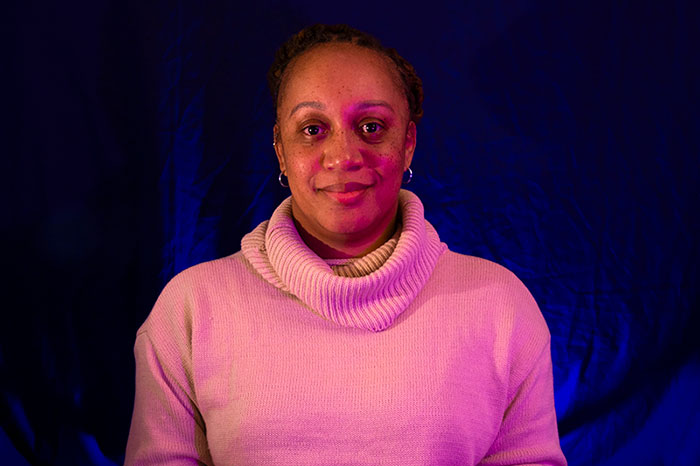Women's History Month: Retired medic carries family legacy, brings unique perspective to HR role

Women have a rich history in the U.S. military since before the nation's founding. During Women's History Month, we are highlighting women across the U.S. Army Medical Materiel Development Activity (USAMMDA) and the contributions they make each day to the Army's medical development and sustainment missions.
When a Soldier retires, it would make sense for them to ride off into the sunset, secure in the knowledge they did more than their fair share in service to the nation. But given 20 years of deployments, leadership development, travels across the globe, and a highly refined sense of duty toward a higher purpose, it also makes sense for a Veteran to seek a work home as a civilian member of a military team.
For Natasha Davis, retired sergeant first class, her work home is the U.S. Army Medical Materiel Development Activity at Fort Detrick, Maryland, where she serves as military human resource specialist and lead administrative assistant with the organization's Administrative Services Division.
Born in Frankfurt, Germany, to Angela and Keith, both Army Veterans, Davis carried on the family tradition, enlisting as a combat medic in 1997 after spending much of her youth in Columbia, South Carolina.
During Women's History Month, Davis reflects on her journey and how her experiences as a woman Veteran and leader shape her approach to continued service – and how to keep making an impact after taking the uniform off for the final time.
"As a female leader, I bring unique perspectives and qualities to my roles in human resources," said Davis. "I prioritize empathy, communication, collaboration, and inclusivity in my approach to managing and supporting our team members. These qualities can help create a positive and inclusive work environment with employees feeling valued and supported."
Davis spent more than 20 years as a medic and enlisted leader, deploying to Afghanistan and serving across the globe while learning values-based leadership, compassion, empathy, and how to set an example for others to emulate. Not lost on her are the direct ties between her experience as a military medical provider and the essential functions USAMMDA teams perform at the center of military medical development.
"Working in Army medical development is a rewarding career path for me because I am passionate about health care, technology, and serving my country," said Davis. "Army medical development offers me the opportunity to make a meaningful impact on the health and well-being of military personnel and their families, as well as contribute to advancements in medical research and innovation."
As part of her normal duties, Davis deftly navigates the intricacies of Army administrative matters – she is a go-to expert for managing the travel, awards, scheduling, and presentation functions that consume a large portion of an Army command's administration and works in tandem with the other administrative leads across USAMMDA to ensure leaders at all levels are working on the same page. Her knowledge base is as solid as her reputation as a no-nonsense, mission oriented female leader with a professionalism honed during more than 20 years in uniform. Though she has traded in Army camouflage for classy business casual, caring for Soldiers and Army civilians is a hallmark of her professional life and a carryover from the leadership skills she learned during her time in service. That perspective adds to her professional acumen, with much of her strength growing from her experience as a woman in uniform.
"The care that I take for Soldiers is because I am a retired Veteran and know what Soldiers need and I make sure that I am available for their human resource actions," said Davis. "Having strong women leaders in military organizations can increase diversity of thought by bringing different perspectives, experiences, and approaches to decision-making processes. Women leaders may offer unique insights and solutions to challenges that may not have been considered before, leading to more innovative and effective strategies."













